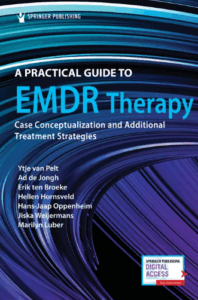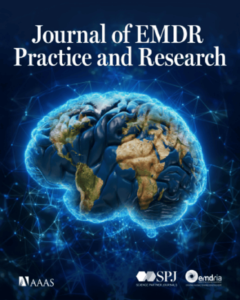EMDR and Psychedelic-Assisted Therapy: A Match Made in Heaven?
Even if you have no interest in psychedelic-assisted therapy, your clients may bring psychedelic experiences—both beneficial & challenging—for reprocessing.
Read MoreExploring EMDR: An innovative approach with Posner Paradigm to reprocessing negative memories in a non-clinical sample (Frontiers in Psychiatry)
This study explored the underlying mechanisms of EMDR, with results suggesting that the mechanism of attention shifting is what plays a critical role in the therapeutic process.
Read MoreA practical guide to EMDR therapy (Springer, 2025)
This EMDR guide offers six trauma-sensitive pathways for identifying core memories and provides flexible, trans-diagnostic tools for treating complex posttraumatic stress disorder (CPTSD) and other clinical challenges.
Read MoreAffect-Focused EMDR: Clinical Strategies for Working with Relational Trauma (Journal of EMDR Practice and Research)
This theoretical article explores affect-focused EMDR, which posits that the reprocessing of affect is central to the EMDR process, rather than the reprocessing of memories or mental representations.
Read MoreDual-task interventions reduce vividness and unpleasantness in both old and new memories (Behaviour Research and Therapy)
This study provides insight into memory consolidation, dual-task effectiveness and interventions, and EMDR.
Read MoreA common denominator: PTSD, rapid eye movements, and fear extinction (Proceedings of the National Academy of Sciences of the United States of America)
Our findings provide evidence linking gaze reinstatement and pattern completion and advance a functional role for EMs in memory retrieval.
Read MoreDisentangling eye movement desensitization and reprocessing mechanisms of action: The impact of eye movements in the eye blink conditioning task (Psychology and Psychotherapy Theory, Research, and Practice)
This study aimed to explore an EMDR mechanism of action by investigating the effect of horizontal eye movements (EM) on fear extinction learning in healthy individuals, using an Eye Blink Conditioning (EBC) task.
Read MoreEye movement patterns drive stress reduction during Japanese garden viewing (Frontiers in Neuroscience)
This study looks at the role of eye movements in the reduction of physiological and psychological metrics of stress during Japanese garden viewing.
Read MoreDo eye movements in REM sleep play a role in overnight emotional processing? (Neuropsychologia)
This article dives into the crossover between neurobiology, rapid eye movements (REM), EMDR, and emotional processing.
Read MoreIn a UK sample, EMDR and other trauma therapists indicate beliefs in unconscious repression and dissociative amnesia (Memory)
This study provides data on UK mental health professionals’ beliefs about repression and dissociative amnesia and two dissociative trauma-related disorders, DID and PNES.
Read MoreTargeting craving with EMDR therapy: Future directions (Addictive Behaviors)
This paper discusses the effects of addiction-focused EMDR therapy based on insights from working memory, and evidence of underlying EMDR mechanisms.
Read MoreNeuroimaging in post-traumatic stress disorder: A narrative review (Archives of Medical Science)
The aim of this review is to provide a comprehensive exploration of the epidemiology, symptoms, and ramifications of PTSD, supplemented by insights gleaned from neuroimaging investigations.
Read More




